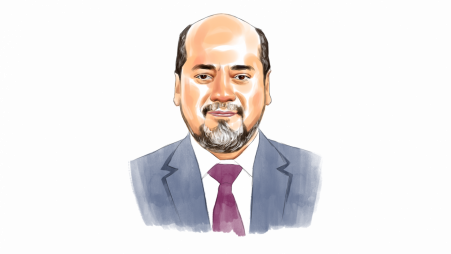Fintech to dictate future banking: Pubali Bank MD

Pubali Bank Managing Director and Chief Executive Officer (CC) Mohammad Ali. Sketch: TBS
“> 
Pubali Bank Managing Director and Chief Executive Officer (CC) Mohammad Ali. Sketch: TBS
People’s affordability of smartphones, a growing mentality to save time and effort for financial affairs, and technological dominance are going to further change the banking landscape in the future, according to Pubali Bank’s Managing Director and Chief Executive Officer (CC) Mohammad Ali.
In a recent interview to The Business Standard, he also mentioned that mobile financial services and mobile-based services from banks are not competitors, rather they are complementary to each other. Apart from sharing his thoughts on how fintech can make deposits more profitable and loans cheaper, the top banker pointed out why mobile banking is important for the development of the rural economy.
TBS: How do you see the future of mobile financial services (MFS) and mobile banking apps?
Mohammad Ali: Everyone, from low-income people to the wealthy, now uses cell phones. In the past, not everyone had a smartphone, but now they do. Even the elderly use smartphones to communicate with relatives via video calls.
As smartphones are in everyone’s hands and many financial matters can be completed through the phones, I believe the future of banking depends on mobile app based banking or fintech. Mobile phone-based financial apps are going to get huge investments worldwide. Apart from retail transactions, the corporate sector will soon become mobile dependent.
In the future, bank branches will face a gradual decline in physical turnout from customers thanks to their increasing tendency to complete transactions with less time and effort. For example, people would queue up to pay electricity bills earlier. But most of them now pay electricity bills online. Ultimately, the banking and finance sector will convert to mobile apps and device-based platforms such as mobile banking.
TBS: Do banking mobile apps and MFS act as business competitors?
Mohammad Ali: No, these two are actually complementary to each other. Mobile financial services basically provide transaction support, while deposits and investments are the banks’ main task. Banking apps offer many benefits in addition to simple money transactions. The more the MFS transactions and the integration with banks increase, the less customer retention in the bank branches. The rapid digitization will lower the operating costs for the banks – so that we can pay higher interest on deposits and provide loans at more reasonable prices. I believe there should be room to pay installments on the loan from MFS.
TBS: Where does Pubali Bank want to see its mobile app “PI” after the next ten years?
Mohammad Ali: Our app is now mostly for retail as we look to add other features in phases. We have joined the government’s new initiative “Binimoy” (a platform for transferring money from one MFS or mobile bank to another MFS or mobile bank). Our ultimate goal is to bring the entire banking solutions of an organization – from opening import LCs (letters of credits) to personal and corporate transactions in both local and foreign currencies – into the app.
TBS: How do customers react to the app?
Mohammad Ali: The customer response has been very good so far. I see “PI” subscribers and transactions almost double every few months. For example, Tk143 crore was transacted through nearly 98,000 transactions in July this year, which jumped to Tk264 crore through 1.28 lakh transactions in November.
TBS: How will the apps help rural customers?
Mohammad Ali: Mobile app-based banking services are very important for the development of the country’s rural economy. According to Pubali’s experiences, deposit collection crossed the Tk1,000 mark while loan disbursements reached around Tk300 crore after launching sub-branches in rural areas. This suggests that the numbers could have performed better if the app was popular in rural areas. The app offers bankers easy banking in rural Bangladesh, including disbursement of agricultural loans.























